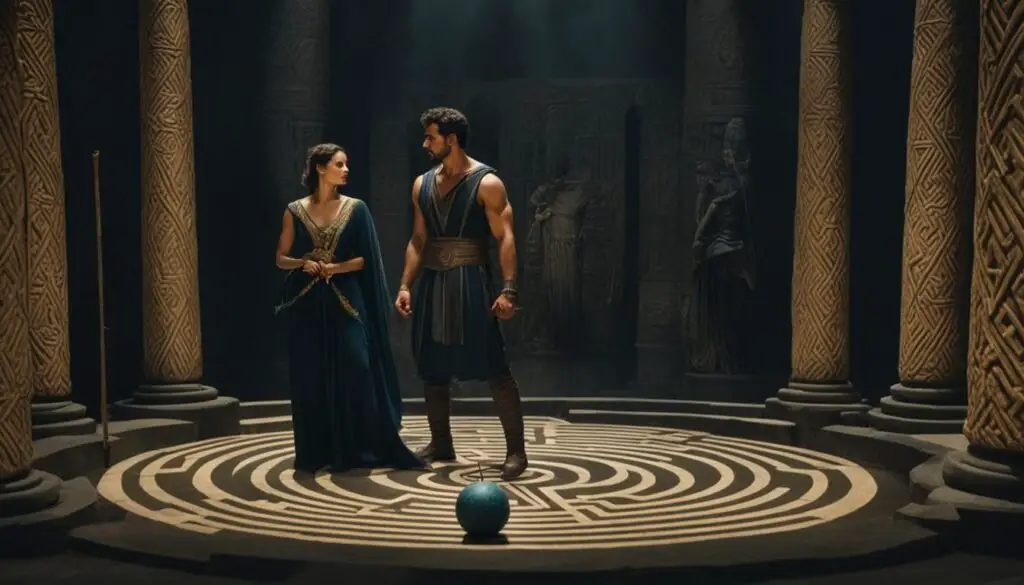Ariadne, a captivating figure of Greek mythology, is shrouded in mystery and possesses a story that has intrigued storytellers and scholars for centuries. Her tale revolves around love, betrayal, and personal growth, painting a vivid picture of the complexities of human emotions. From her role in aiding Theseus in his quest to defeat the Minotaur to her misfortunate abandonment on the island of Naxos, Ariadne’s journey showcases her resourcefulness, bravery, and the transformative power of her experiences.
In Greek mythology, Ariadne is often associated with the Minotaur and the Labyrinth, as well as her connection to Dionysus, the Greek god of wine and revelry. Her enigmatic character has permeated various forms of art and literature throughout history, with artists and writers capturing her beauty, grace, and the dramatic events of her life. Despite the wealth of information available, Ariadne remains an enigmatic figure, captivating audiences in modern culture and leaving a lasting impression on Greek mythology.
Key Takeaways:
- Ariadne is a pivotal figure in Greek mythology, renowned for her cunning mind and tragic love story with Theseus.
- Her story revolves around themes of love, betrayal, and personal growth, showcasing the complexities of human emotions.
- Ariadne’s role in aiding Theseus in navigating the Labyrinth and defeating the Minotaur highlights her resourcefulness and bravery.
- Her connection to Dionysus underscores the intertwining of mythology and the transformative power of wine in ancient Greek culture.
- Ariadne’s story has inspired countless artistic interpretations and continues to resonate with audiences, making her a timeless figure in Greek mythology.
The Myth of Ariadne
The myth of Ariadne reveals a captivating tale of love, betrayal, and the profound consequences of one’s actions. Ariadne, a princess, falls deeply in love with Theseus, a heroic figure from Athens. Their story centers around their perilous journey through the treacherous Labyrinth and their triumph over the fearsome Minotaur.
As Theseus embarks on his quest to slay the Minotaur and end the gruesome sacrificial rituals imposed by King Minos, Ariadne becomes his trusted ally. With her cunning mind, she aids Theseus in navigating the intricate maze, providing him with a thread that guides him safely through the labyrinth’s twists and turns.
image portrays the mythical Ariadne, a symbol of strength and resilience.
Together, Ariadne and Theseus successfully defeat the Minotaur, liberating the people of Athens from their terrifying ordeal and securing their own escape from the labyrinth’s clutches.
However, tragedy befalls the star-crossed lovers when, overcome by his quest for glory or inadvertently influenced by the gods, Theseus abandons Ariadne on the island of Naxos. Lonely and heartbroken, Ariadne finds solace in the arms of another, Dionysus, the god of wine and revelry. Their union cements her place in the pantheon of Greek mythology.
The myth of Ariadne explores profound themes of love and betrayal, highlighting the intricate and often heartbreaking intricacies of human relationships. It serves as a cautionary tale, reminding us of the consequences that follow our choices and the profound impact they can have on our lives.
Ariadne and the Minotaur
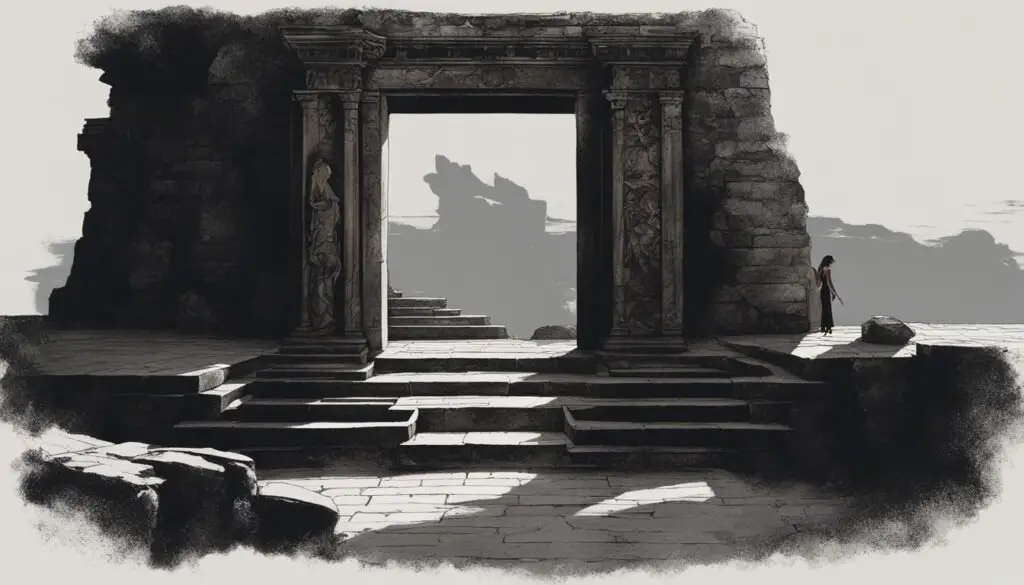
Ariadne’s connection to the Minotaur and the Labyrinth is a significant aspect of her story. As the daughter of King Minos, she plays a crucial role in helping Theseus navigate the labyrinth and defeat the monstrous Minotaur. Her assistance to Theseus, as well as her involvement in the construction of the labyrinth, showcases her resourcefulness and bravery.
- Ariadne’s resourcefulness shines as she provides Theseus with a ball of thread, enabling him to find his way out of the intricate maze.
- Her bravery is evident as she faces the terrifying Minotaur head-on, aiding Theseus in his quest to save Athens from the creature’s wrath.
- Ariadne’s involvement in the construction of the labyrinth itself adds an intriguing layer to her character, highlighting her intelligence and cunning.
This mythical tale of Ariadne and the Minotaur not only showcases her pivotal role in the hero’s journey of Theseus but also serves as a reflection of the eternal struggle between good and evil. As Theseus battles the Minotaur, Ariadne’s unwavering support becomes a symbol of hope and strength amidst darkness and chaos.
Ariadne’s Relationship with Dionysus
Another important aspect of Ariadne’s story is her relationship with Dionysus, the Greek god of wine and revelry. After being abandoned by Theseus, Ariadne finds solace in the arms of Dionysus, who takes her as his wife. This union between Ariadne and Dionysus represents the intertwining of two powerful forces in Greek mythology – love and wine.
In ancient Greek culture, wine was seen as more than just a beverage; it was associated with transformation, celebration, and the divine. Dionysus, as the god of wine, embodied these qualities, and his connection with Ariadne further emphasizes the transformative power of love and wine in the mythological realm. It is through her relationship with Dionysus that Ariadne finds a new purpose and a sense of belonging after the heartbreak of being abandoned by Theseus.
Representations of Ariadne in Art and Literature

Ariadne’s captivating story in Greek mythology has inspired countless artists and writers throughout history. From ancient times to the Renaissance era, her image has been immortalized in various forms of art and literature. Through these representations, Ariadne’s beauty, grace, and the dramatic events of her life have been vividly brought to life.
One of the most famous depictions of Ariadne can be found in the ancient sculptures of Greece. These exquisite works of art often portray her as a stunning and ethereal figure, capturing her allure and significance in Greek mythology.
During the Renaissance period, Ariadne became a popular subject in paintings. Artists such as Titian and Botticelli created stunning masterpieces featuring her story. These paintings beautifully illustrate the intense emotions of love, betrayal, and personal transformation that define Ariadne’s narrative.
Moreover, Ariadne’s story has also found its way into the realm of literature. Poets and authors have drawn inspiration from her tale, infusing it with their unique perspectives and interpretations. Through their words, Ariadne’s myth has been brought to life once again, captivating readers and allowing them to delve deeper into the complexities of her character.
To get a visual glimpse of Ariadne’s representation in art, take a look at this stunning image:
Ariadne’s story in art and literature serves as a testament to the enduring fascination with her character and the timeless themes she embodies. Her image, immortalized in sculptures and paintings, continues to inspire and captivate audiences. Through these representations, the legacy of Ariadne in Greek mythology is kept alive, ensuring that her story remains a cherished part of our cultural heritage.
The Symbolism of Ariadne
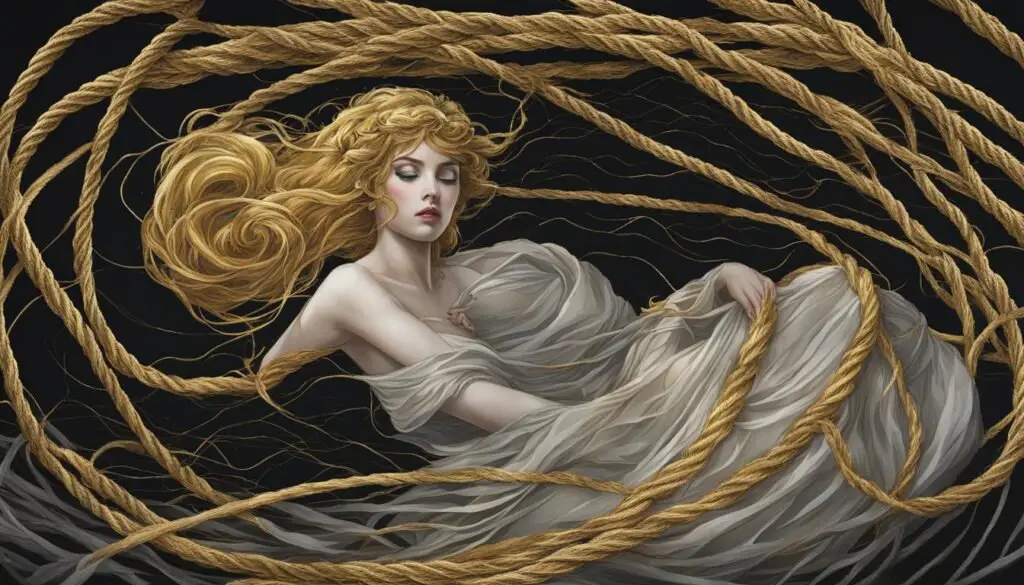
Ariadne’s story is filled with symbolism that represents profound themes of love, betrayal, and personal growth. Her journey, from being the daughter of a powerful king to experiencing abandonment and finding love once again, showcases the intricate complexities of human emotions and the transformative power of life’s experiences.
One of the primary symbolic elements in Ariadne’s story is love. Her deep affection for Theseus drives her to help him navigate the treacherous labyrinth and defeat the fearsome Minotaur. This act of love and sacrifice represents the lengths one may go to for the sake of another, as well as the power of love to overcome seemingly insurmountable obstacles.
However, alongside love, betrayal also plays a significant role in Ariadne’s symbolism. Following Theseus’ victory, he abandons Ariadne on the island of Naxos, leaving her heartbroken and alone. This betrayal demonstrates the fragility of trust and the devastating consequences it can have on relationships. Ariadne’s betrayal serves as a cautionary tale, reminding us of the importance of loyalty and the risks associated with placing blind faith in others.
Ariadne’s story also exemplifies personal growth and transformation. Despite the hardships she endures, Ariadne ultimately finds solace in her relationship with Dionysus, the Greek god of wine and revelry. Her journey from a deserted princess to a cherished goddess showcases the resilience of the human spirit and the capacity for personal growth even after experiencing great loss and heartache.
The symbolism embedded within Ariadne’s story resonates with audiences, as it reflects the universal themes and emotions that humans grapple with throughout their lives. Whether it be the power of love, the pain of betrayal, or the potential for personal growth, Ariadne’s story serves as a poignant reminder of the complexities and transformative nature of the human experience.
Ariadne’s Influence in Greek Mythology
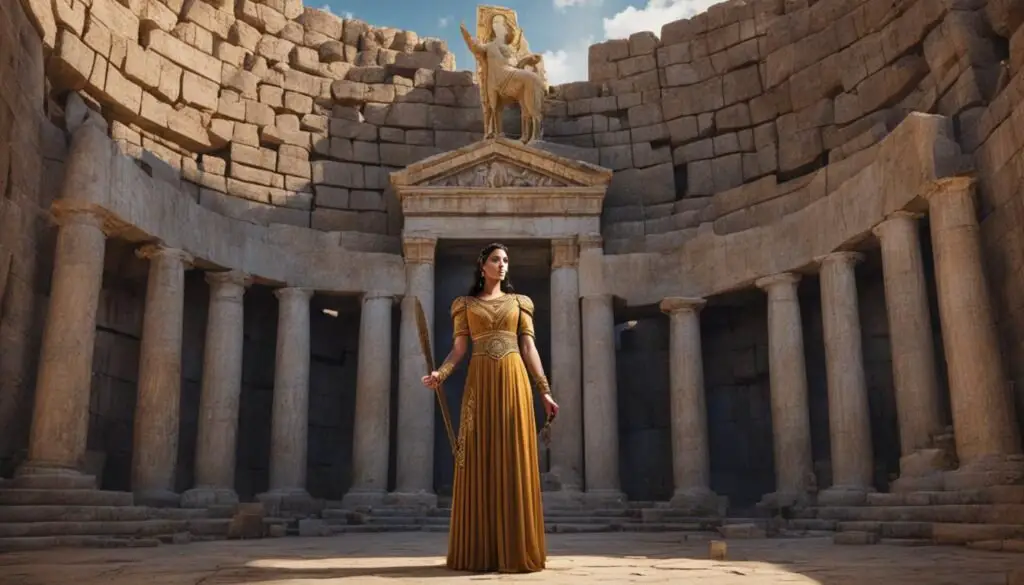
While Ariadne’s story is captivating in its own right, her influence stretches beyond her personal narrative. She makes notable appearances in other myths and legends, solidifying her significance within the ancient Greek pantheon.
Ariadne’s connections to prominent figures like Dionysus and Theseus further elevate her status in Greek mythology. Her involvement in their stories showcases her impact on their journeys and underscores her importance in the larger mythological framework.
One such example is Ariadne’s relationship with Dionysus, the Greek god of wine and revelry. After being abandoned by Theseus, Ariadne finds solace and companionship with Dionysus, eventually becoming his wife. This union not only connects the two characters but also explores the intersection of mythology and the transformative power of wine in ancient Greek culture.
- Ariadne’s influence extends beyond her personal story.
- She appears in other myths and legends.
- Ariadne is connected to influential figures like Dionysus and Theseus.
- Her relationships highlight her significance in Greek mythology.
In addition to her relationships, Ariadne’s resourcefulness and bravery play a significant role in shaping other mythological narratives. For instance, her assistance to Theseus in navigating the Labyrinth and defeating the Minotaur is not only crucial to their escape but also symbolizes her role as a guiding force in their heroic endeavors.
Overall, Ariadne’s presence in various myths and her connections to key figures underscore her lasting impact and solidify her position as a significant figure in Greek mythology.
Ariadne’s Influence in Greek Mythology:
- Her connections with Dionysus and Theseus elevate her significance.
- Ariadne’s relationships highlight the transformative power of wine and love.
- Her resourcefulness and bravery shape other mythological narratives.
The Enigma of Ariadne

Despite the wealth of information available about Ariadne, she remains an enigmatic figure in Greek mythology. The complexities of her character, the choices she made, and the consequences of those choices continue to intrigue scholars and enthusiasts. Her story serves as a reminder of the multi-faceted nature of ancient myths and the enduring allure of their enigmatic characters.
As we delve into the myth of Ariadne, her significance in Greek mythology becomes apparent. Her involvement with Theseus in navigating the labyrinth and defeating the Minotaur exemplifies her resourcefulness and bravery. But it is her subsequent abandonment by Theseus and her union with Dionysus that complicate her story and add layers of mystery.
- Who was Ariadne really? Was she a victim or a heroine?
- What motivated her to help Theseus and ultimately face heartbreak?
- What does her relationship with Dionysus signify?
These questions have sparked countless debates and interpretations, revealing the enduring enigma that surrounds Ariadne. Scholars and enthusiasts continue to analyze her story, searching for hidden meanings and unraveling the complexities of her character.
Ariadne’s tale serves as a testament to the power of storytelling and the lasting impact of ancient myths. Her enigma captivates us, drawing us deeper into the world of Greek mythology and reminding us of the enduring allure of its enigmatic characters.
Ariadne in Modern Culture

Ariadne’s captivating story and complex character have not been confined to ancient mythology alone. She has found her way into various forms of modern culture, leaving a lasting impact on literature, theater, and even video games. Her presence in these different mediums showcases the timeless appeal and universal themes surrounding her mythological tale.
Contemporary Literature
Ariadne has become a beloved character in contemporary literature, with authors drawing inspiration from her story to create new narratives and interpretations. Her strength, resilience, and emotional journey continue to resonate with readers around the world. Whether as a central character or a supporting figure, Ariadne’s presence adds depth and intrigue to the pages of modern books.
Theater Productions
Ariadne’s compelling story has also graced the stages of theaters, captivating audiences with lavish productions and engaging performances. Theater companies have embraced her myth, bringing it to life through innovative sets, costumes, and powerful acting. The drama and emotion of Ariadne’s plight are heightened on the stage, creating a truly immersive experience for theatergoers.
Video Games
The realm of video games has not been untouched by Ariadne’s allure. Her story has served as inspiration for game developers who seek to create immersive and story-driven experiences. In these virtual worlds, players can embody characters similar to Ariadne, navigating intricate mazes, solving puzzles, and unraveling complex narratives that echo the themes of her mythological journey.
Through literature, theater, and video games, Ariadne continues to captivate audiences and inspire new creative expressions. Her story transcends time and remains a testament to the enduring power of Greek mythology in modern culture.
The Legacy of Ariadne
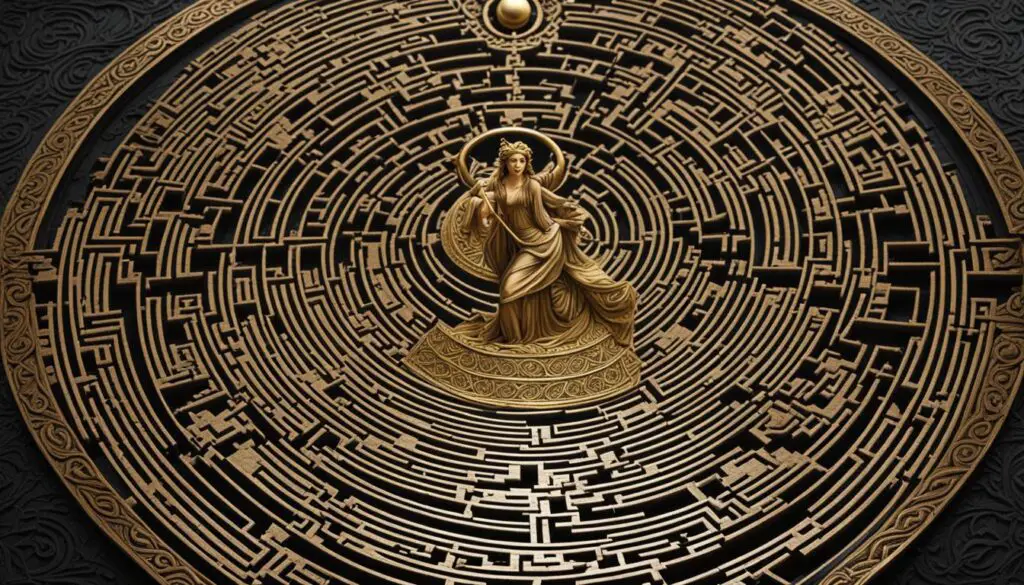
Ariadne’s story has left an indelible mark on Greek mythology, and her legacy continues to resonate through the ages. Her tale, filled with love, betrayal, and personal growth, holds valuable lessons and insights for generations to come.
Ariadne symbolizes the resilience of the human spirit, as she overcomes numerous trials and upheavals throughout her life. From her role in aiding Theseus in defeating the fearsome Minotaur to her resilience in the face of heartbreak, Ariadne exemplifies the strength and determination that humans possess in the face of adversity.
Her story also delves into the complexities of love, showcasing both its transformative power and its potential for betrayal. Ariadne’s ill-fated romance with Theseus serves as a cautionary tale, reminding us of the intricacies and risks that accompany matters of the heart.
Furthermore, Ariadne embodies the power of individual agency, as she takes control of her own destiny. Despite the hardships she faces, she never loses her sense of self or succumbs to despair. Ariadne’s ability to make choices and shape her own future serves as an inspiration for those seeking empowerment and autonomy.
The enduring resonance of Ariadne’s story can be seen in its continued presence in popular culture and art. From ancient sculptures and paintings to modern adaptations in literature and theater, her tale continues to captivate and inspire audiences across different mediums.
Key takeaways:
- Ariadne’s legacy encompasses her resilience, the complexities of love, and the power of individual agency.
- Her story serves as a reminder of the enduring impact of Greek mythology.
- Ariadne’s triumph over adversity showcases the strength of the human spirit.
- The complexities of love and betrayal are explored through Ariadne’s ill-fated relationship with Theseus.
- Ariadne’s ability to take control of her own destiny inspires notions of empowerment and autonomy.
- Her story continues to captivate and inspire across various art forms and popular culture.
The Significance of Ariadne in Greek Mythology
Ariadne, the Greek goddess of love and fate, holds a significant place in Greek mythology. Her story is filled with elements of love, betrayal, and personal growth, reflecting the themes and motifs present throughout Greek mythology. As a complex and influential figure, Ariadne’s actions and choices have far-reaching consequences, making her a pivotal character in the ancient pantheon.
Throughout Greek mythology, Ariadne’s story resonates with audiences due to its timeless themes. Her tumultuous love affair with Theseus and her subsequent abandonment on the island of Naxos highlights the complexities of human emotions and the consequences of one’s actions. This narrative serves as a cautionary tale and a reflection of the intricacies of love and betrayal.
In addition to her love story, Ariadne’s role in assisting Theseus in navigating the treacherous Labyrinth and defeating the ferocious Minotaur showcases her resourcefulness and bravery. Her intricate understanding of the maze and her ability to provide the hero with a way out adds to her significance in Greek mythology.
Furthermore, Ariadne’s connection to Dionysus, the Greek god of wine and revelry, adds another layer to her story. After being abandoned by Theseus, Ariadne finds solace in the arms of Dionysus, becoming his wife and showcasing the transformative power of love.
Key Points:
- Ariadne is a complex and influential figure in Greek mythology.
- Her story explores themes of love, betrayal, and personal growth.
- Her actions and choices have far-reaching consequences.
- Ariadne’s role in assisting Theseus and her connection to Dionysus further contribute to her significance.
Overall, Ariadne’s story and her portrayal in Greek mythology demonstrate the enduring appeal and significance of her character. From her relationships to her pivotal role in key events, Ariadne remains a captivating figure whose story continues to captivate audiences to this day.
Conclusion
Ariadne’s myth is an intriguing and enduring tale that holds a significant place in Greek mythology. Her involvement in helping Theseus defeat the fearsome Minotaur showcased her intelligence and resourcefulness. Furthermore, her relationship with Dionysus represents the transformative power of love and the complexities of human emotions.
Ariadne’s story continues to captivate audiences through the ages, as her enigmatic nature creates intrigue and fascination. Her journey from betrayal to finding love again resonates with readers, making her a timeless and relatable figure in Greek mythology.
From ancient sculptures to contemporary literature, Ariadne’s story has left a lasting impact on art and culture. Her representations in various art forms highlight her beauty, grace, and the dramatic events of her life. As a symbol of love, betrayal, and personal growth, Ariadne’s legacy endures, reminding us of the enduring power of Greek mythology.
FAQ
Who is Ariadne in Greek mythology?
Ariadne is a pivotal figure in Greek mythology known for her cunning mind and tragic love story with Theseus.
What is the myth of Ariadne?
The myth of Ariadne tells the captivating story of a princess who falls in love with Theseus and aids him in navigating the Labyrinth and defeating the Minotaur.
What is Ariadne’s connection to the Minotaur and the Labyrinth?
As the daughter of King Minos, Ariadne plays a crucial role in helping Theseus navigate the labyrinth and defeat the monstrous Minotaur.
How is Ariadne related to Dionysus?
After being abandoned by Theseus, Ariadne is taken in by Dionysus and becomes his wife.
How has Ariadne’s story been represented in art and literature?
Ariadne’s story has been depicted in various forms of art and literature throughout history, emphasizing her beauty, grace, and the dramatic events of her life.
What does Ariadne’s story symbolize?
Ariadne’s story represents themes of love, betrayal, and personal growth, reflecting the complexities of human emotions and the transformative power of experiences.
What is Ariadne’s role in Greek mythology?
Ariadne appears in various myths and legends, showcasing her influence and significance in the ancient Greek pantheon.
Why is Ariadne considered an enigmatic figure?
Despite the wealth of information available about Ariadne, her character and choices continue to intrigue scholars and enthusiasts, making her an enigmatic figure in Greek mythology.
How does Ariadne’s story continue to resonate in modern culture?
Ariadne’s story has captivated audiences in contemporary literature, theater productions, and video games, inspiring new interpretations of her story.
What is the legacy of Ariadne?
Ariadne represents the resilience of the human spirit, the complexities of love, and the power of individual agency, leaving a lasting impact on Greek mythology.
Why is Ariadne significant in Greek mythology?
Ariadne holds a significant place in Greek mythology as a complex and influential figure, exploring themes and motifs present throughout ancient Greek myths.


